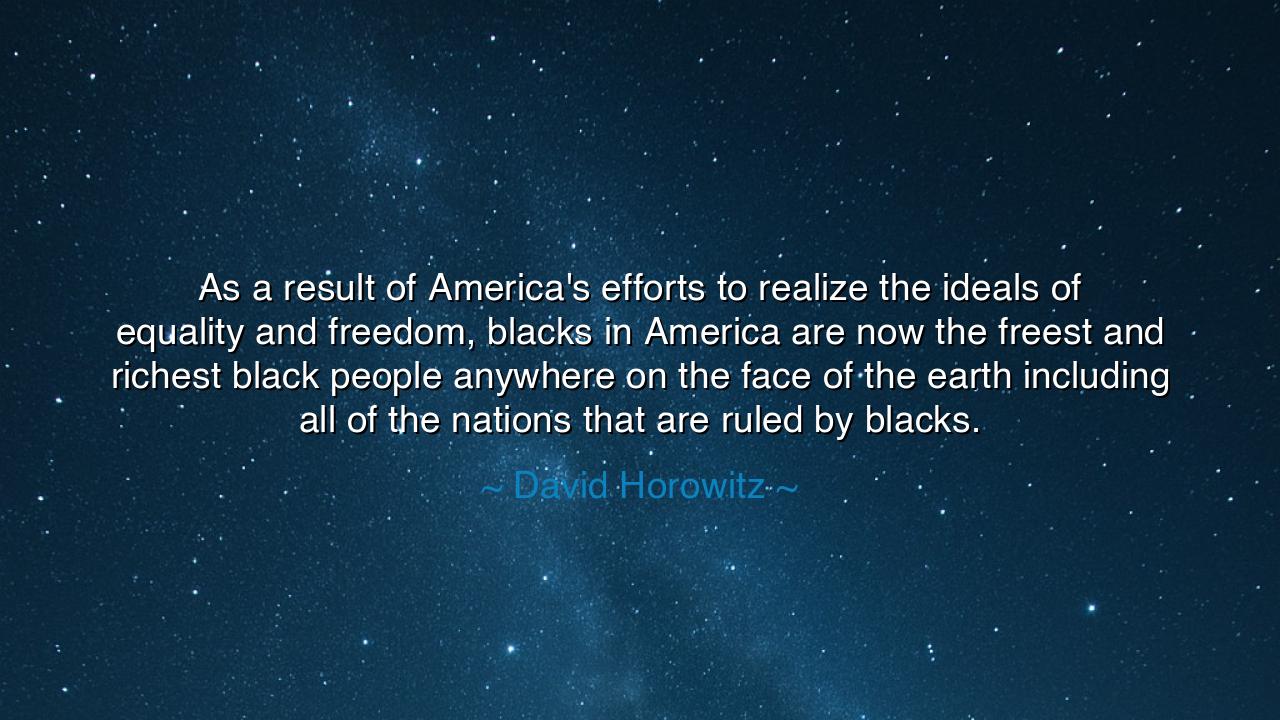
As a result of America's efforts to realize the ideals of
As a result of America's efforts to realize the ideals of equality and freedom, blacks in America are now the freest and richest black people anywhere on the face of the earth including all of the nations that are ruled by blacks.






When David Horowitz wrote, “As a result of America’s efforts to realize the ideals of equality and freedom, blacks in America are now the freest and richest black people anywhere on the face of the earth, including all of the nations that are ruled by blacks,” he spoke from a conviction rooted in both gratitude and controversy — a recognition of progress and a challenge to perception. His words stir both admiration and unease, for they ask us to confront the paradox of America: a nation born in freedom yet scarred by bondage, a land of ideals still wrestling with their fulfillment. Horowitz’s statement is not merely political; it is philosophical — a reflection on how struggle and opportunity coexist within a single story, and how progress, though incomplete, is still real and worth defending.
The origin of this quote lies in Horowitz’s long engagement with the moral and cultural debates surrounding race, freedom, and history in the United States. Once a voice of the radical left in the 1960s, he later became a conservative thinker, seeking to defend what he saw as the achievements of American democracy. His declaration does not deny the atrocities of slavery or the injustice of segregation — rather, it asserts that within the American framework of liberty, redemption has been possible. The founding ideals of equality and freedom, though born in contradiction, have given rise to transformation: the end of legal slavery, the victories of civil rights, and the emergence of a thriving Black middle class. His words are, therefore, not a denial of pain but a recognition that history has also been a story of resilience, ascension, and perseverance.
Yet, Horowitz’s statement must be understood not as triumphalism but as a meditation on the power of ideals. America’s promise has never been its perfection, but its pursuit — the relentless striving to align action with principle. It is in this striving, Horowitz suggests, that progress has been made. The same soil that once bore the chains of slavery now nurtures freedom’s fruit, not by accident, but by the continued moral awakening of its people. He calls upon us to see not only the sins of the past but the courage of those who overcame them, to honor both the suffering and the success born from endurance.
History gives life to this truth. Consider the story of Frederick Douglass, born a slave in Maryland, who taught himself to read and later became one of the most eloquent defenders of liberty in the 19th century. Douglass, who once condemned America’s hypocrisy, later came to praise its Constitution as “a glorious liberty document,” seeing in its principles the potential for universal freedom. His transformation — from despair to faith in the nation’s ideals — mirrors the spirit of Horowitz’s words. It was the moral strength of freedom’s creed, not the perfection of its practice, that allowed men like Douglass, and generations after him, to rise above bondage and claim their place in history.
Horowitz’s quote also serves as a provocation — a challenge to the culture of grievance that forgets how much has been gained through courage and opportunity. He reminds us that the measure of progress is not found in perfection, but in contrast. From the auction block to the Oval Office, from Jim Crow to Juneteenth, the journey of Black America stands as a testament not only to the indomitable will of a people, but also to the possibility embedded in a nation’s founding promise. Where once the law enslaved, now the law protects. Where once the voice of protest was silenced, now it echoes through every institution. The climb continues, but the summit is nearer because of the freedoms that have already been claimed.
In the style of the ancients, we might say: America is like a great forge — its fire burns bright, but its heat purifies. Through trial, through suffering, through relentless striving, a stronger metal is formed. Horowitz’s reflection is not the complacency of one who declares the work finished, but the gratitude of one who sees that the labor has borne fruit. For if a people who were once enslaved can now thrive as free citizens, it is proof not only of their strength and courage, but of the enduring vitality of the ideals that made such triumph possible.
Let this be the lesson passed down to future generations: that freedom, once won, must be guarded with vigilance; that equality, once earned, must be extended with humility. To honor the journey of Black Americans is to recognize both their struggle and their success, to see in their story the reflection of a nation’s conscience. And to honor Horowitz’s insight is not to deny injustice, but to acknowledge hope — the hope that ideals, once ignited, can transform even the darkest corners of human history. Let us, then, continue the labor that began centuries ago: to make freedom not only an inheritance of the few, but the shared birthright of all — until the promise of America becomes the promise of all humanity.






AAdministratorAdministrator
Welcome, honored guests. Please leave a comment, we will respond soon